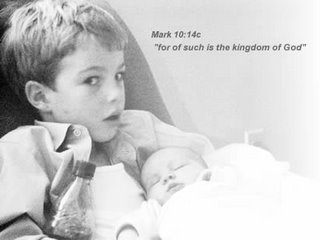
With the recent resurgence of Reformation theology, many adhering to the Doctrines of Grace search for ways to expose the world to their beliefs. This shirt peaks the interest of onlookers and provides an excellent bridge for introducing the Biblical beliefs recovered and heralded during the the Reformation.
Friday, July 21, 2006
Reformation T-Shirt from Monergism.com
Thursday, July 20, 2006
Our Children God's Children - Rev C. Bouwman

"Very much of our time as parents is taken up by our children; they have a central, very central place in our daily lives. We tie their shoelaces, dry up their tears, sit with them at the table, read them stories. We send them off to school, fix their torn clothes, help with their homework, listen to their stories, kiss them goodnight. We coach them so they can get their licence, rejoice with them when they make profession of faith, clutch our hearts as they make their first forays into the work force, put together again the heart broken by the failed romance. And once they're married, the involvement remains (be it on a different level), and the fun starts with the next generation. Children take up so much of our time.
With this article, I want to draw out that the children entrusted into our care are heirs of God's kingdom; God has claimed these children for Himself in His covenant of grace, so that all His promises in Jesus Christ are for them. This royal identity implies that each of our children are exceedingly special to God. This identity in turn affects 'even dictates' the way we treat our offspring." Read More
Tuesday, July 18, 2006
HISTORY: unwrapped, A Radio Ministry of American Vision
Bones that Started a Reformation 
* The Lollards derived their name from the medieval Dutch word meaning “to mutter” (lollaerd), possibly a reference to their style of worship, which was based on reading the scriptures. The derivation may be of Latin origin, from lollen, “to sing softly” (cf.
Monday, July 10, 2006
John Calvin's Birthday - July 10th, 1509
Born July 10, 1509 in Noyon, France, Jean Calvin was raised in a staunch Roman Catholic family. The local bishop employed Calvin's father as an administrator in the town's cathedral. The father, in turn, wanted John to become a priest. Because of close ties with the bishop and his noble family, John's playmates and classmates in Noyon (and later in Paris) were aristocratic and culturally influential in his early life. continue
Thursday, July 06, 2006
A Baptist Stuck in a Presbyterian “Body”?
I’m a baptist stuck in a presbyterian (church) body, and that’s okay. God put me here.
I’ve been doing some thinking about the fact that my family and I will soon be joining a Presbyterian church, and how that fits in with my self-identification as a “reformed baptist” (and if it even matters). Through high school and especially in college, I was one of those adamant “just a Christian”-type Christians, valiantly refusing to be shackled to a denominational label. Why, then, did being a “baptist” suddenly matter so much to me? Do I really care that much about congregational governance? How much study have I really put into baptism? Continue

